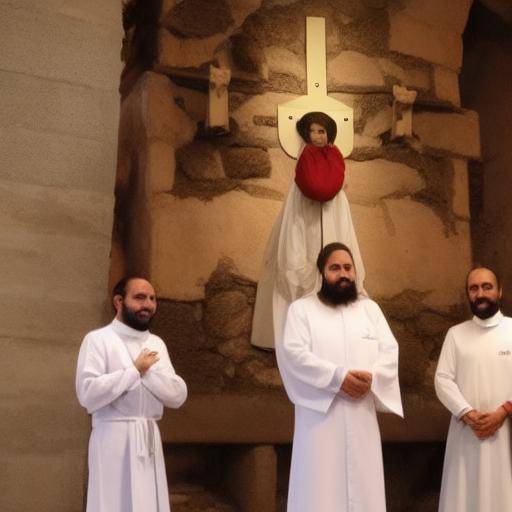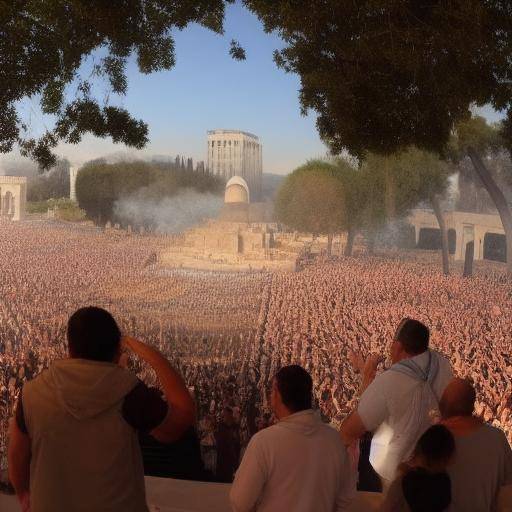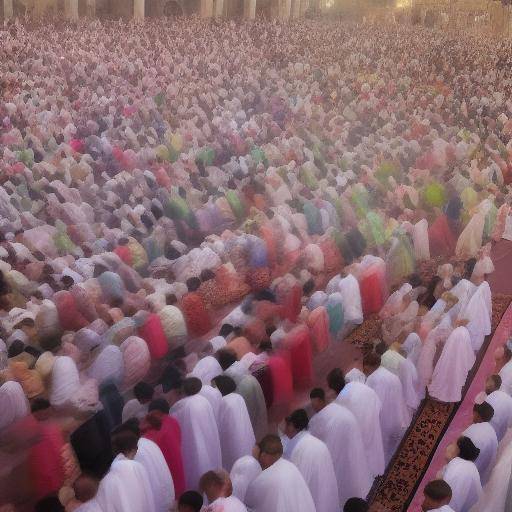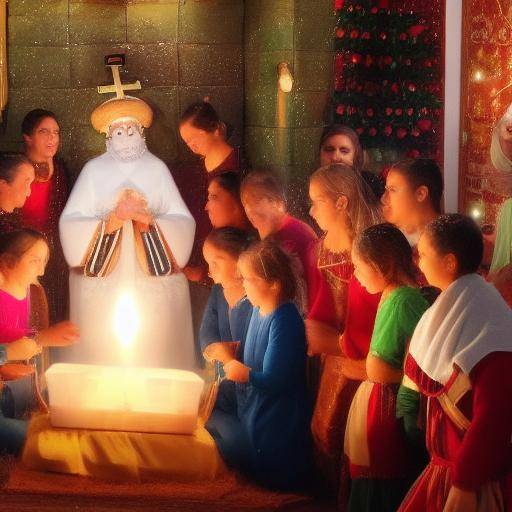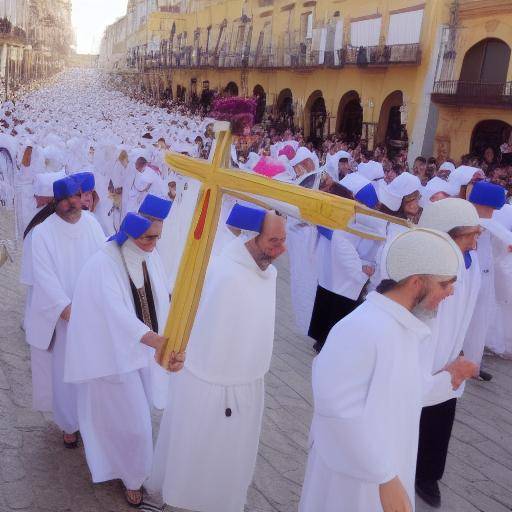
Holy Week is a period of great importance in the Christian liturgical calendar, commemorating the Passion, Death and Resurrection of Jesus Christ. During this week, various religious celebrations are held that attract faithful and tourists from around the world. In this article, we will explore in detail the history, meaning, traditions, and the importance of the holidays of Holy Week, as well as the shocking processions that take place in different parts of the world.
Introduction
Holy Week, also known as the Greater Week, is the most intense liturgical moment of the year for the Catholic Church and many Christian denominations. It begins with Palm Sunday and culminates in the celebration of the Resurrection of Jesus on Easter Sunday. During these days, key events of Jesus' life are commemorated, from his triumphal entry to Jerusalem to his crucifixion and subsequent resurrection.
In this article, we will explore the rich history and symbolism of Holy Week, as well as the associated traditions and festivities, with a special focus on the exciting processions that take place in different parts of the world. We will discover the cultural and spiritual roots of these celebrations, as well as their social and tourist impact. We will also offer practical advice for those who wish to experience Holy Week in a more profound and meaningful way.
History and Meaning
Holy Week has its roots in Jewish tradition, specifically at the Passover feast, which commemorates the liberation of the Hebrew people from slavery in Egypt. For Christians, Holy Week acquires an even deeper meaning, as it focuses on events leading to the death and resurrection of Jesus Christ, fundamental to the Christian faith.
Biblical origins
The biblical account of the Passion of Christ is found in the four canonical Gospels: Matthew, Mark, Luke and John. These accounts detail the events surrounding the Last Supper, the arrest of Jesus on the Mount of Olives, his crucifixion in Calvary and his resurrection. These events form the core of the celebration of Holy Week.
Historical Development
Over the centuries, Holy Week has acquired numerous traditions and rituals, influenced by the culture and religious practices of Christian communities in different regions of the world. These traditions include processions, theatrical representations of the Passion of Christ, night vigils and the memory of the Last Supper through the celebration of the Eucharist.
Current Celebrations
Today, Holy Week is celebrated in various forms around the world. From the solemn celebrations and celebrations in the churches to the colorful and vibrant street processions, each community brings its own interpretation and style to this festival.
Celebrations and Processions
Religious Festivals
Religious festivals of Holy Week are an expression of the devotion and faith of believers. Churches and communities organize a wide range of activities to commemorate the Passion of Christ. These activities include special Masses, prayer meetings, spiritual retreats and theatrical representations of Passion.
Processions
Holy Week processions are one of the most striking and moving aspects of these celebrations. These processions often include religious images, Passion symbols, and devotees carrying crosses, banners and candles. The streets are filled with sacred music, incense and religious fervor as the processions advance through the streets, visually and excitingly recalling the highlights of the Passion of Christ.
Analysis in Deep
The celebration of Holy Week and associated processions have a significant impact on multiple levels. From a religious point of view, these festivities offer the faithful the opportunity to deepen their spiritual relationship with God and to revive more vividly the central events of their faith. On the other hand, from a cultural and tourist perspective, Easter celebrations attract national and international visitors, becoming events of great economic relevance for many communities.
Social and Tourist Impact
The Holy Week processions are not only religious events but also cultural manifestations that attract a wide audience. These celebrations promote a sense of community and belonging, reinforcing the links between the inhabitants of a locality. In addition, Holy Week holidays have become a tourist attraction of great importance, attracting visitors who seek to experience these unique expressions of faith and tradition closely.
Current Challenges and Trends
Despite its importance and popularity, the celebrations of Holy Week face challenges today. The balance between religious authenticity and tourist marketing is a recurring theme, as some communities seek to preserve the integrity of these festivities against the growing influence of tourism. In addition, the impact of the COVID-19 pandemic has posed significant challenges for the organization of mass events, which has led to the adaptation of many traditional celebrations.
Comprehensive review
In exploring the festivals of Holy Week, it is important to consider both the spiritual and religious aspects and the cultural, economic and tourist impacts of these celebrations. Reviewing these holidays in their entirety allows us to better understand their scope and relevance in today's society.
Futures
As communities seek to balance the preservation of traditions with adaptation to contemporary changes, Holy Week celebrations are likely to evolve in response to current challenges. The integration of modern technologies, the promotion of sustainability and collaboration among different actors could shape the future of these festivities, ensuring their continuity and relevance in the twenty-first century.
Comparative analysis
By comparing the holidays of Holy Week with other religious celebrations, such as Christmas festivals or pilgrimages to shrines, it is possible to identify significant differences and similarities. While Christmas focuses on the birth of Jesus, Holy Week focuses on his redeeming sacrifice and resurrection. Both festivities, however, share elements of devotion, rituals and artistic expressions that enrich the spiritual experience of the faithful.
Practical Tips and Recommendations
Authentic Experience
If you want to experience Easter in a deeper and more meaningful way, we recommend you immerse yourself in local traditions and participate in celebrations in a respectful way. Learn about process times, churches that offer special services and complementary activities, such as religious art exhibitions or sacred concerts.
Respect and Consideration
In attending Holy Week celebrations, it is essential to show respect for the religious beliefs and practices of the local community. Avoid interrupting processions, follow the directions of the organizers and respect the sacred spaces. Remember that these celebrations are profoundly significant expressions of faith and devotion to those who participate in them.
Perspectives and Expert Reviews
To get a more comprehensive view of the importance and impact of Holy Week and associated processions, we have consulted experts in religious history, cultural anthropology and religious tourism. The following opinions offer a broad and balanced perspective on these holidays.
Interview with Dr. Pablo Gutiérrez, Religious Historian
"Holy Week is a time of profound spiritual significance, but also of great historical and cultural wealth. Associated processions and celebrations have evolved over the centuries, reflecting the diversity of expressions of faith and devotion throughout the world. It is essential to preserve this cultural and religious heritage for future generations, maintaining a balance between authenticity and adaptation to contemporary challenges."
Dra's reflections. Ana Martínez, Anthropologist Cultural
"Holy Week celebrations are live expressions of the collective identity and cultural memory of the communities. Through rituals, symbols and shared activities, participants strengthen their sense of belonging and solidarity. These holidays offer a unique opportunity to explore the intersection between the sacred and the secular, revealing the continuing relevance of these traditions in the contemporary world."
Case Studies and Practical Applications
Case Study: Processions in Seville, Spain
The processions of Holy Week in Seville are known for their splendour and solemnity. During this week, thousands of people gather to witness the processional cortex, which includes mystery and palio steps, accompanied by music bands and costumes. This annual celebration attracts visitors from around the world, significantly contributing to the local economy and consolidating the reputation of Seville as one of the most outstanding destinations to experience Holy Week.
Global Implementation: Impact and Diversity of Processions
From the Caribbean to the Philippines, Holy Week processions manifest in a wide variety of forms and styles. These celebrations reflect the cultural diversity, artistic creativity and religious devotion of communities around the world, from the stewardships in Antigua to the penitential processions in the Philippines. This approach in plurality and adaptability is fundamental to understanding the universality of faith and the celebration of Holy Week.
Future Trends and Predictions
Technological Innovation
With the advance of technology, Easter celebrations are undergoing a significant transformation. From live transmissions of processions to interactive applications that offer virtual guides, the integration of technology is expanding the scope of these festivities, allowing a global audience to participate and appreciate these cultural and religious expressions.
Sustainability and Social Responsibility
In response to current environmental challenges, many communities have adopted sustainable approaches to Holy Week celebrations. From the use of biodegradable materials in processions to the promotion of environmentally friendly practices, these initiatives reflect a renewed commitment to the preservation of natural resources and respect for creation.
Conclusion
Holy Week is a moment of deep reflection, devotion and celebration for millions of people around the world. From religious holidays to impressive processions, these celebrations are a living expression of faith, culture and community. In exploring the history, meaning and impact of Holy Week, we have been able to appreciate the richness and diversity of these holidays, as well as their continued relevance in contemporary society.
FAQs
1. What is the origin of the Holy Week processions?
The processions of Holy Week have their roots in the religious and cultural tradition of Christian communities, often derived from medieval and Renaissance practices.
2. What are some of the most outstanding destinations to experience Holy Week?
Seville in Spain, Antigua in Guatemala, Quito in Ecuador and Taxco in Mexico are some of the destinations known for their spectacular Easter processions.
3. What does the colors and symbols have in the processions of Holy Week?
The colors and symbols used in the Holy Week processions have deep symbolic meanings. For example, the purple represents penance, the white symbolizes purity and victory, and the red is associated with sacrifice and love.
4. How can I participate respectfully in the Holy Week processions?
If you want to participate in the Holy Week processions, it is important to show respect for religious practices and follow the indications of the organizers. Avoid interrupting processions and respecting sacred spaces.
5. Why do some Holy Week processions include theatrical performances?
Theatrical representations of the Passion of Christ, known as "steps" in some cultures, are a way to visualize and commemorate events related to the death and resurrection of Jesus Christ. These representations are an artistic and devotional expression rooted in the tradition of many communities.
6. What is the role of music in the processions of Holy Week?
Music plays a fundamental role in the processions of Holy Week, creating an emotional and solemn atmosphere. The bands of music, corals and religious songs are an integral part of these celebrations, enriching the experience of the participants and spectators.
Holy Week and associated religious festivities, including imposing processions, continue to be a source of inspiration, devotion and community cohesion throughout the world. As these celebrations evolve to adapt to contemporary challenges, preserving their spiritual and cultural wealth remains a priority for the communities that celebrate them. Holy Week is a celebration that unites people from different cultures and beliefs in a spirit of respect, reflection and unity around the central figure of Christianity, Jesus Christ.
This concludes our journey through the celebrations and processions of Holy Week, a unique experience that invites us to deepen the faith, history and cultural diversity that enriches this religious festival.
We hope that this article has provided a complete and captivating view of Holy Week, religious holidays and shocking processions, as well as practical advice, expert reflections and case studies that enrich our understanding of these celebrations.
Remember that Holy Week is much more than a series of historical events; it is an opportunity to reflect on faith, hope and spiritual renewal. Whether you participate actively in the celebrations or just want to know more about this stunning holiday, Holy Week offers a unique window to some of the oldest and most significant religious and cultural traditions in the world.

